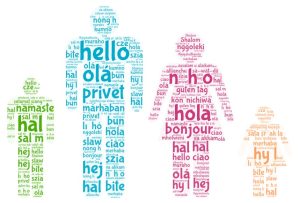1.3 Cultural Competence
 Figure 1.3.1 – Word Art by Denise Halsey – Hello
Figure 1.3.1 – Word Art by Denise Halsey – Hello
Creating cultural competence is essential on college campuses, in our communities, and in the workplace. Cultural competence, as defined by the Intercultural Development Inventory, is the capability to shift cultural perspective and adapt—or bridge—behaviour to commonality and difference.
The IDI(1) is an assessment-driven approach to developing individual intercultural competence and to build cultural competence through adaptation of behaviour to cultural differences and commonalities.
What defines cultural competence, according to college students’ diverse perspectives ranges from a monocultural to intercultural perspective: Denial, Polarization, Minimization, Acceptance, and Adaptation. The monocultural mindset uses cultural differences and commonalities based on an individual’s own cultural perspectives and values and often uses stereotypes as a way to identify cultural differences. The intercultural mindset is more able to make sense of commonalities and differences of culture based on their own cultural practices and values and those of the other’s culture. They are more likely to use cultural generalizations that recognize cultural differences and support more complex perceptions and experiences based on difference and commonality.
Cultural Competence will always be a work in progress. There are so many differences in the communities that we will work with. It is important to be aware of people as individuals as well as their culture and populations. One size does not fit all so it is important to understand that we will serve communities that have different culture backgrounds that may dictate who can do the interview (i.e. Orthodox Jewish Woman would have a female intake worker), as well as those with disabilities, language barriers, or seniors to give a few examples. This being the case there are times when a neighbour or friend can accompany them to assist with the situation.
Video 1: What is Cultural Competence. by Arkansas Open Educational Resources (OER). University students talk about what cultural competence is and what cultural competence means to them personally. Project: Creating Cultural Competence by Jacquelyn Wiersma-Mosley and Margaret Miller Butcher.
Transcript

Video 2: Cultural Competence in Denial and Polarization.by Arkansas Open Educational Resources (OER). University students discuss what their experiences have been with either themselves or with others who have mindsets in Denial and Polarization.
Transcript

Video 3: Cultural Competence in MInimilization. by Arkansas Open Educational Resources (OER). University students discuss what their experiences have been with either themselves or with others who have mindsets in Minimization.
Video 4: Cultural Competence in Acceptance and adaptation. by Arkansas Open Educational Resources (OER). University students discuss what their experiences have been with either themselves or with others who have mindsets in.
Transcript

Video 5: Becoming Cultural Competence. by Arkansas Open Educational Resources (OER). University students discuss what their experiences have been with either themselves or with others who have mindsets in.
Transcript

Attribution:
Arkansas Open Educational Resources (OER). Creative Commons Attribution license (reuse allowed)
References
IDI – Intercultural Development Inventory. (n.d.). Intercultural Development Inventory. Intercultural Development Inventory. Retrieved July 23, 2022, from https://idiinventory.com/
Arkansas Open Educational Resources (OER). (2021, August 27). Video 1: What is Cultural Competence? [Video]. YouTube. https://www.youtube.com/watch?v=tsWbODQiDWs
Arkansas Open Educational Resources (OER). (2021c, August 27). Video 3: Cultural Competence in Minimization [Video]. YouTube. https://www.youtube.com/watch?v=i9PkoY7I4n4
Arkansas Open Educational Resources (OER). (2021d, August 27). Video 4: Cultural Competence in Acceptance and Adaptation [Video]. YouTube. https://www.youtube.com/watch?v=siIBYJ8etjY
Arkansas Open Educational Resources (OER). (2021a, August 25). Video 5: Becoming Culturally Competent [Video]. YouTube. https://www.youtube.com/watch?v=7_M4Q6d05L8

